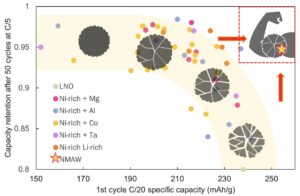Ines Hamam
Technologist
BMW
Date: September 17, 2025
Time: 1000-1100h ET
In this webinar, Al and W are compared as individual dopants as well as co-dopants to arrive at an optimal cathode active material design. The objective is to improve the energy density of the materials without compromising cycle life, a feat which was previously thought unattainable for Ni-rich, Co-free layered oxide materials. The findings emphasize the importance of understanding the effect of chemical composition and synthesis conditions on the morphology of the material particles. In turn, this morphology plays a determinant role in the cycling performance of the electrode.
In addition to conventional material characterization methods (such as x-ray diffraction, scanning electron microscopy, incremental capacity analysis, etc.), measurements of the particles’ strength were also analyzed to provide better insight on how the material will perform in an expanding-contracting electrode. Mechanical resilience if often overlooked when studying and designing cathode materials, however, particularly in materials that are prone to microcracking, this information provides an important piece of the puzzle to understand the degradation mechanisms of the electrode.
This led to the development of a Co-free cathode material which can provide a capacity of 260 mAh/g on the first cycle while retaining 95 percent capacity after 50 cycles in half cells cycled to 4.3 V. At a lower upper-cutoff voltage of 4.06 V, this material delivers 220 mAh/g with no observable capacity loss after 100 cycles.
An interactive Q&A session follows the presentation.
Benefits of attending the webinar
Learn about:
-
The effect of Al and/or W doping in layered lithium metal oxide polycrystalline materials.
-
The importance of synthesis conditions on the structural properties and electrochemical performance of Ni-rich materials—and how even the best materials synthesized at the wrong conditions can perform poorly!
-
How studying the mechanical strength of cathode materials can provide insight about their ability to retain capacity over cycling.
Presenter
Ines Hamam obtained her PhD in Materials Engineering in 2024 and her MSc in Physics in 2020 at the Dalhousie University, under the supervision of world-renowned battery expert Dr. Jeff Dahn. She is now a technologist at BMW, furthering the world effort of transport electrification.
Learn more about upcoming ECS Webinars and review our previous webinar recordings.
Thanks to the webinar sponsors who make these complimentary programs possible!
Interested in presenting in the ECS Webinar Series?
Email your presentation title and abstract to education@electrochem.org for consideration.







